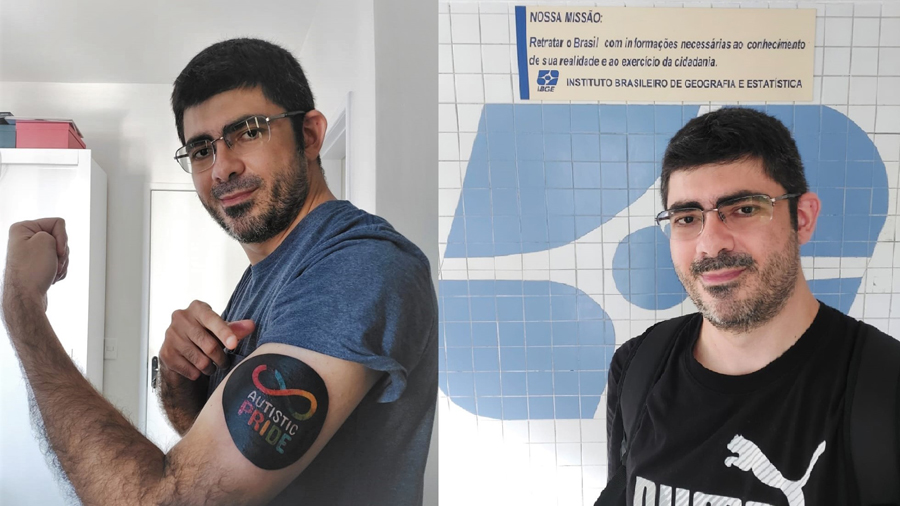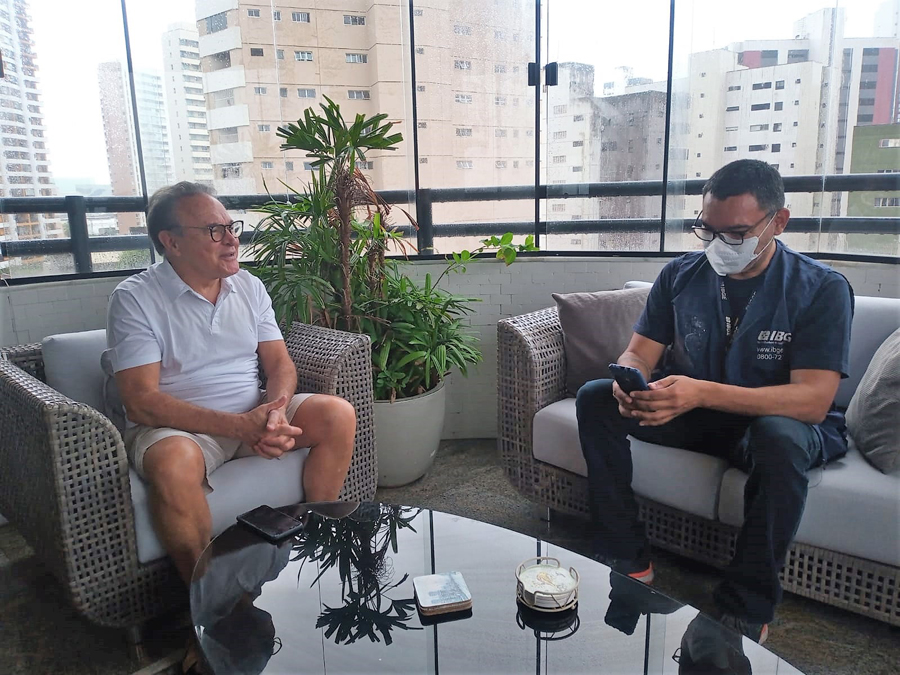A door opener: question about autism in the 2022 Census makes advances possible for the ASD community
February 27, 2023 15h28 | Last Updated: March 03, 2023 15h19
“Have you ever been diagnosed with autism by a health professional?” This simple and objective question represents the first step taken by the Population Census for the identification of Autism Spectrum Disorder (ASD) at the national level. The inclusion of the theme in the 2022 edition of the Census was determined by Law No. 13,861 of 2019, which is the result of a claim and articulation by the Brazilian autistic community itself.
The question about autism is present in the Sample Questionnaire, administered in approximately 11% of the households in the country, which represents approximately 8.5 million households. The sample questionnaire takes more time to be completed, as it includes, in addition to all the items present in the Basic Questionnaire, other more specific ones, such as: religion or cult, fertility, disabilities, migration and displacement.
These questions are being answered by a significant portion of Brazilian households, which are defined in order to represent the most diverse strata of society, thus composing a sample considered statistically valid. This means that, once data collection is completed, they will undergo a mathematical treatment that will allow expanding the result, obtaining a panorama that concerns the country as a whole. In this way, it will be possible to know, in an unprecedented way, the portrait of autism in Brazil.
“The pain and gain of having such a diagnosis", says João Paulo de Castro
“I remember seeing reports showing fathers, mothers, and even autistic people themselves holding up signs with the message: 'We can't wait! Autism in the Census!'", recalls João Paulo de Castro, about the movement that fought for the inclusion of the theme in the current edition of the census. Bachelor of Laws, temporary worker at the IBGE and writer in his spare time, João Paulo lives his life as a persons classified in the autism spectrum range. And it is from this perspective that he assesses the progress that this question about autism represents: “It is an important step, as it is a survey that proposes to go to all social groups, according to color, creed, age, income, and to other minorities who also have people with the autism diagnosis.”

“Inclusion in every way”, that is what João Paulo de Castro hopes the autistic community can get with the Census results.
João Paulo was not at home when the Census visited his household, but his parents received the enumerator and answered the questions on the Basic Questionnaire. Although his household was not drawn among those answering the Sample Questionnaire, and, consequently, the question about autism, he thinks that the methodology adopted by the IBGE will make it possible to reach an accurate result on the Brazilian autistic population. “Obviously there was a reduction in the number of Census questions, but I think this is an important question to ask. This question, although very short, will throw some light on how to better develop and implement public policies related to issues such as education, labor market, housing and health”, he argues.
Author of the books “I, adult and autistic: Language, speech acts as forms of life” (2019) and “An atypical life: memories and other writings of an adult on the autistic spectrum” (2022), João Paulo comments that it was not an easy path from the diagnosis to acceptance. “I was a little indifferent, and sometimes I didn't accept it. I thought that I was someone meant to be unhappy, isolated, with few friends, although I felt under pressure to socialize - which caused me great pain", comments João Paulo, who was diagnosed with mild autism in his childhood, at 10 years old, but was only told about it nine years later.
It took me another ten years before acceptance: “I found out about it in 2005, and in 2015 I decided to carry out this reassessment process. I had to better understand why I was like that and know how to play the game. I had to reframe what it was to be autistic and accept it, not with resignation, but as a human characteristic, a difference that was intrinsic to me.” Seeking to improve his quality of life and to have more self-esteem, João Paulo made the decision to share his thoughts and experiences with other people: “I started to open up, speak at one event or another, follow groups on social media. And in this process I started to feel less alone, when I discovered that more people had similar experiences. As they say, the pain and gain of having this diagnosis.”
The very decision to sign the employment contract at the IBGE also results from this acceptance process and from the support he has received from his family and the autistic community. Today João Paulo is in his second job in the Superintendence of the IBGE in Ceará (SES/CE): the first was in 2016 as Research and Mapping Agent (APM) and he has been a Census Analyst as of 2022. In addition to the impacts on his personal life, he has also observed positive reactions from other people, whether they are autistic or not: “I think that sharing these experiences allows many people to relate, have less doubts about themselves and better accept the diagnosis. Sometimes we talk to mothers and fathers who have doubts and anxieties about the future of their autistic children. And they like this sharing of information that I propose, it gives them courage and hope.”
“Inclusion in every way”, is what João Paulo expects as a result of the 2022 Census. “Until last year, there were rumors of a special education system, and I see that it is not appropriate to separate autistic people from others”, he mentions, referring to the discussion around Bill No. 3803 of 2019, which proposed a model of specialized education for the autistic population. “How are we going to be prepared to enter the university, the job market? It makes more sense to be in the regular education system, with the support of a mediator. Inclusion is beneficial not only for the autistic student, but also for others, who will learn to accept differences more easily”, he concludes.
“We will probably have a more or less autistic world”, says José Lucivan Miranda
“Autism is a day-to-day issue, on families's day order. Rarely is a family today free from having someone among its mebers diagnosed with autism”, argues child neurologist José Lucivan Miranda, who received the IBGE team at the condominium where he lives in Fortaleza-CE on February 15 and answered the questions of the census. He insisted on participating in the 2022 Census, both for identifying the importance of the survey for the country, and also for understanding the progress represented by the inclusion of a question about autism.

"We need accurate data", claims Lucivan Miranda, child neurologist, about the importance of autism in the Census.
Master in Neuropediatrics and professor of Medicine at the Federal University of Ceará (UFC), Dr. Miranda has observed, based on his clinical experience and academic knowledge, a significant increase in the number of autistic patients. This was what motivated him to direct his career towards the study of the theme and offer assistance to this population. In addition to mere individual observation, the neurologist points out that there is actually a growth trend, which, by the way, the Census can help identify: “Worldwide, what statistics show is that the incidence and prevalence of autism has increased. Around here, we have sparse data, collected in some regions or cities. But no number for the national level.”
The doctor attributes the increase to several factors, including the popularization of the discussion on the subject and, consequently, the search for the diagnosis, in addition to the expansion of the criteria for identifying autism. He explains that the scientific protocol adopted worldwide for identifying ASD is the 5th edition of the Diagnostic and Statistical Manual of Mental Disorders, known as DSM-5, published in 2013 by the American Psychiatric Association (APA). “Autism is essentially based on changes in two areas: language, that is, communication, and behavioral changes. The diagnosis is purely clinical, not requiring any tests”, highlights the neurologist.
As president of the Center for Early Treatment and Stimulation (NUTEP) at the UFC, Dr. Miranda defends the importance of identifying autism as early as possible so that proper treatment can be administered. “If you have a diagnosis within the first three years of age, and if that child is well cared for by a multidisciplinary team, this autism can change its course. There is no talk of a cure, but of improvement for the patient”, argues the doctor, who clarifies that autism is usually accompanied by other conditions, such as epilepsy, sleep disorders, Attention Deficit Disorder (ADHD), etc., which can be mitigated by correct treatment.
Diagnosis and treatment are two of the biggest difficulties faced by the autistic population in Brazil, points out the neurologist: “It is still difficult for some families to get this diagnosis, which sometimes does not come until very late. On the other hand, the vast majority of children from lower social classes who are diagnosed with it remain untreated, because there are no available treatment in the public health facilities.” Thus, Lucivan sees the Census as fundamental for this population to be better known and, thus, receive more attention from the public authorities: “Autism is in all ethnic groups, all strata and social classes. It affects everyone in general. We need to have concrete data, because everything is based on data. Knowing the number of autistic people will send the alert to the authorities, so that more services can de dedicated to these patients. Probably [with the Census] we will have a more or less autistic world."
Autism in the 2022 Census
For the elaboration of the question about autism, the 2022 Population Census was based on the definition adopted by the World Health Organization, which understands Autism Spectrum Disorder (ASD) as “a series of conditions characterized by some degree of impairment in social behavior, in communication and language, and by a narrow range of interests and activities that are unique to the individual and performed repeatedly”. ASD can be identified even in childhood and usually persists into adulthood.
Since the Census methodology establishes the completion of one questionnaire per household, the questions are directed to only one resident, who answers for himself/herself and for the other people with whom he/she lives. This also occurs with the question about autism present in the Sample Questionnaire: the respondent must consider whether each of the residents, regardless of their age, has already received the diagnosis of autism from a health professional, such as a doctor, psychologist, speech therapist, among others.
Despite being an apparently short question, it enables data crossing on autism with other information in the questionnaire. Thus, with the results of the 2022 Population Census, it will be possible to draw a profile of autistic people according to their sex, age, color or race, place of residence, income range, structure of residence, access to basic services, etc., allowing a better understanding of the conditions in which this portion of the Brazilian population lives.
